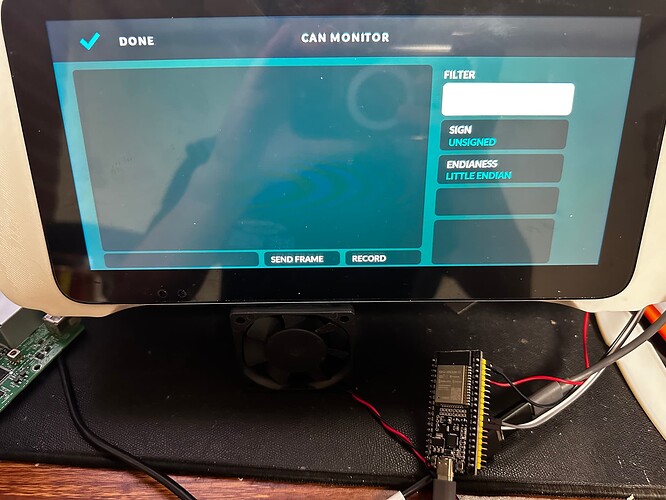There is no can adapter that supports LS can in the manual you created, so I’m trying to make a custom reader using esp32 and SN65HVD230. After writing the code, the computer gets the value on the serial monitor, but the realdash doesn’t get any value when connected.
How should I solve it?
#include <ACAN_ESP32.h>
const int ledPin = 2; // LED 핀 번호 (ESP32의 기본 LED 핀은 GPIO 2)
void setup() {
Serial.begin(115200);
pinMode(ledPin, OUTPUT); // LED 핀을 출력으로 설정
ACAN_ESP32_Settings settings(100000UL);
// Default Tx: GPIO4, Rx: GPIO5
settings.mRxPin = GPIO_NUM_17;
settings.mTxPin = GPIO_NUM_16;
const uint32_t ret = ACAN_ESP32::can.begin(settings);
if (ret == 0) {
Serial.println("CAN Configuration OK!");
} else {
Serial.print("CAN Configuration error 0x");
Serial.println(ret, HEX);
}
}
void loop() {
CANMessage frame;
// 수신된 CAN 메시지가 있는 경우
bool messageReceived = ACAN_ESP32::can.receive(frame);
if (messageReceived) {
// LED를 깜박임
digitalWrite(ledPin, HIGH); // LED 켜기
delay(100); // 100ms 대기
digitalWrite(ledPin, LOW); // LED 끄기
// "CAN 44 프레임" 형식으로 변환하여 출력
Serial.print("44 33 22 11 "); // 고정된 헤더 출력
// CAN 프레임 ID 출력 (리틀 엔디안 형식)
uint32_t canID = frame.id;
Serial.printf("%02X %02X %02X %02X ",
canID & 0xFF,
(canID >> 8) & 0xFF,
(canID >> 16) & 0xFF,
(canID >> 24) & 0xFF);
// 데이터 출력 (8바이트 고정)
for (int i = 0; i < 8; i++) {
if (i < frame.len) {
Serial.printf("%02X", frame.data[i]);
} else {
Serial.print("00"); // 남은 바이트는 0으로 패딩
}
if (i < 7) {
Serial.print(" ");
}
}
Serial.println();
} else {
Serial.println("No message received");
}
// 약간의 지연을 추가하여 계속해서 메시지를 수신할 수 있도록 함
delay(1000); // 지연 시간을 늘려 메시지 수신 상태를 명확히 파악
}
